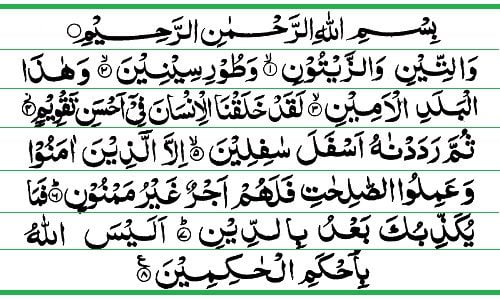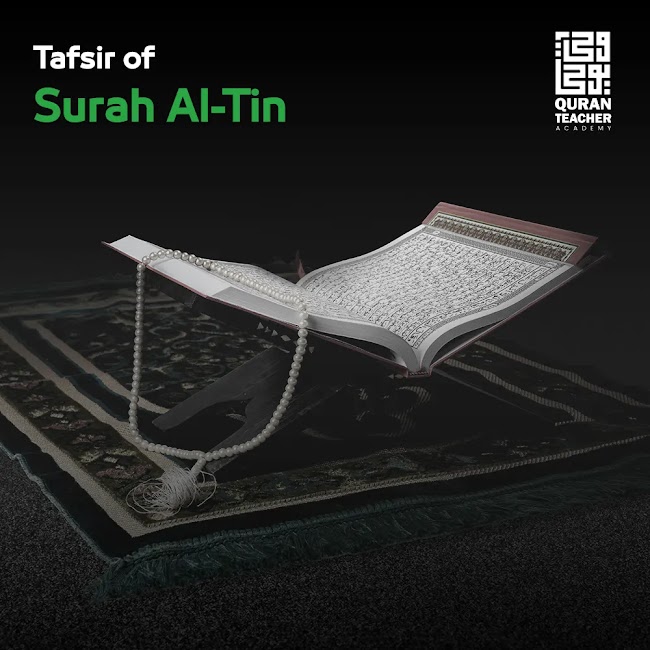Surah At-Tin is a great surah, carrying eloquent meanings, and invites man to meditate on the creation of Allah Almighty, and commitment to his common sense, as the surah begins with a section from Allah Almighty with figs, olives and the phase of years, which are three things that indicate the ability and wisdom of Allah Almighty,
then the surah confirms that Allah created man in the best calendar, that is, in the best form and form, and made him a common sense that indicates belief in oneness. In this article, we explain the Tafsir of Surah At-Tin and its most prominent virtues and meanings.
The history and reasons for the descent of Surat At-Tin
Surah At-Tin is a Meccan surah revealed before the Prophet’s migration, containing eight verses. It was called by this name because it begins with the oath with figs and olives, which are blessed and useful fruits for humans,
and it was not mentioned in the correct Sunnah the reason for the revelation of the entire surah, but some commentators mentioned the reasons for the revelation of some of its verses, such as:
1- The Almighty says: (We have created man in the best calendar) It was revealed to the infidels who were denying the resurrection after death, so God told them that He created them in the best form and condition.
2- The Almighty says: (Then we repeated it below the Savlin) It was revealed to a group of people during the era of the Messenger of Allah (may Allah’s peace and blessings be upon him) who had advanced in age until they lost their minds and apostatized from their religion, so Allah told them that He would restore them to the lowest levels of hell, except for those who believe and do good before their minds go, for those have a great reward.
Read also about: Tafsir of Surah Quraysh
Virtues of Surah At-Tin
Surat At-Tin is one of the chapters of the Noble Quran that contains numerous virtues, wisdom, and admonitions in its verses. Some of the virtues of Surah At-Tin include:
The Messenger of Allah, peace be upon him, said: “Whoever recites Surat At-Tin, Allah will grant him two qualities: sound health and certainty as long as he remains in this worldly life. And when he dies, Allah will reward him according to the number of people who have recited this Surah.”
The Messenger of Allah, peace be upon him, said: “O Ali, whoever recites Surah At-Tin and Surah Az-Zaitoun (Olive), it is as if he has given in charity the weight of a mountain of gold in the cause of Allah, and Allah will record for him sixty rewards for every verse he recites.”
Surah At-Tin includes the mention of the blessed trees, the fig and the olive, and the mountains of Sinai where the Torah was revealed to Prophet Moses, peace be upon him. It also encompasses the sacred city of Makkah, where the Quran was revealed to Prophet Muhammad, peace be upon him. These locations are the abodes of divine news and heavenly scriptures.
Surah At-Tin reminds us of the honor bestowed upon humanity through their creation in the best form, and it highlights the descent of disobedience to the lowest depths. It also emphasizes divine justice in the rewards for believers and disbelievers.

Read also about: Tafsir of Surah Al-Zalzalah
Tafsir of Surah At-Tin
Surah At-Tin is a Makkan surah consisting of eight verses. The surah begins with Allah swearing by the fig and the olive, as well as Mount Sinai and the sacred city of Makkah. It then informs about the creation of humans in the best form and their descent to the lowest of the low, except for those who believe and perform righteous deeds.
It questions the reason for humans denying the religion and resurrection, and concludes with a statement about the justice and wisdom of Allah.
By the fig, and the olive, (1)
By Mount Sinai, (2)
And by this city of security (Makkah). (3)
Verily, We created man of the best stature (mould), (4)
Then We reduced him to the lowest of the low, (5)
Save those who believe (in Islamic Monotheism) and do righteous deeds, then they shall have a reward without end (Paradise). (6)
Then what (or who) causes you (O disbelievers) to deny the Recompense (i.e. Day of Resurrection)? (7)
Is not Allah the Best of judges? (8)
وَٱلتِّينِ وَٱلزَّيۡتُونِ (1) وَطُورِ سِينِينَ (2) وَهَٰذَا ٱلۡبَلَدِ ٱلۡأَمِينِ (3) لَقَدۡ خَلَقۡنَا ٱلۡإِنسَٰنَ فِيٓ أَحۡسَنِ تَقۡوِيمٖ (4) ثُمَّ رَدَدۡنَٰهُ أَسۡفَلَ سَٰفِلِينَ (5) إِلَّا ٱلَّذِينَ ءَامَنُواْ وَعَمِلُواْ ٱلصَّٰلِحَٰتِ فَلَهُمۡ أَجۡرٌ غَيۡرُ مَمۡنُونٖ (6) فَمَا يُكَذِّبُكَ بَعۡدُ بِٱلدِّينِ (7) أَلَيۡسَ ٱللَّهُ بِأَحۡكَمِ ٱلۡحَٰكِمِينَ (8)
Read also about: Tafsir of Surah Al-Masad
Verse 1: “By the fig and the olive”
This verse contains Allah’s oath by the fig and the olive, which are well-known fruits with numerous benefits for the body. Scholars have differed regarding the meaning of the fig and the olive, with some saying they refer to the mosques of Damascus and Jerusalem, or two mountains in Damascus and Jerusalem, or the mosques of Nuh (Noah) on Mount Judi and Ilyas, or simply the fig and the olive themselves.
Verse 2: “And Mount Sinai”
This verse contains Allah’s oath by Mount Sinai, the mountain from which Allah spoke to Musa (Moses), peace be upon him.
Verse 3: “And this secure city”
This verse contains Allah’s oath by this secure city, which is Makkah, the most noble of lands and most beloved to Allah. It is said that the reason for the oath by these locations is that in each of them, messengers with divine laws were sent to humanity.
Verse 4: “Certainly, We created man in the best form”
This verse informs about Allah’s excellence in creating humans in the best form and state. He endowed them with intellect, nature, and a balanced body capable of thinking and perceiving.
Verse 5: “Then we reduced him to the lowest of the low”
This verse describes the degradation of humans to the lowest level if they disbelieve in Allah, disobey Him, and show arrogance towards His creation. They become the most miserable of people and farthest from Allah’s mercy.
Verse 6: “Except for those who believe and do righteous deeds, for them is a reward uninterrupted”
This verse makes an exception for the believers who perform righteous deeds. They will receive a great reward from Allah that will never be interrupted or exhausted.
Verse 7: “So, what yet causes you to deny the Recompense?”
This verse questions the reason for humans denying the religion and resurrection, despite the clear signs and undeniable truths in this universe. How can they reject what the Messenger of Allah, peace be upon him, informed them about matters of the unseen?
Verse 8: “Is not Allah the most just of judges?”
This verse asserts that Allah is the most just of judges in His creation and command. There is no contradiction to His wisdom and justice, and everything He does is for a great wisdom and lofty purpose.
Read also about: Tafsir of Surah Al-Falaq
You can now view the interpretation of the surahs of the Qur’an through Wahion Youha Academy, which specializes in Quranic sciences and Islamic studies, as it offers several courses specialized in Islamic history and Quranic sciences,
such as Tajweed science, the science of interpretation, jurisprudence and comparative jurisprudence, the science of readings and the Qur’anic context, and other sciences that the individual is looking for, and it also provides experimental classes to teach children the Holy Quran, book with us now, and start your journey.


